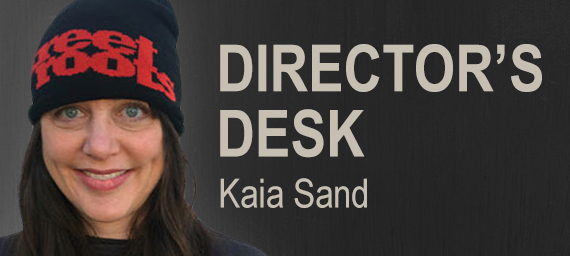It was a voicemail I’ll save: “I got moved into my apartment. I just got the keys today!”
I imagined this particular Street Roots vendor in an apartment sitting at a table with a vase of bold, bright pink flowers she loves so much.
It’s a privilege at Street Roots to hear people’s good news of housing, and we’ve been hearing quite a bit of it lately. The Street Roots vendor whose voice is calmer than it was a year ago, who fills notebooks with drawings. The man who is so happy to come in showered and groomed. There’s a lot of gratitude.
These same people have lived homeless for, collectively, decades – sleeping directly on the dewy grass, surviving in tents on soggy ground, sleeping in Right 2 Dream Too, C3P0 villages, in many different shelters. So many years of homelessness.
The scale of homelessness feels apocalyptic. We have a deeply unequal society at its structure. But while it’s not visible at a level a passerby can see, each person who can actually afford to be indoors is another celebration.
I wish we could collectively experience each time someone moves into housing, like a firework spreading over the Portland sky.
Portland city and Multnomah County governments have proposed using $18 million to purchase shelters – which could include property such as motels. This is urgently needed before private equity real estate financiers render that housing unavailable to the poorest of our neighbors, as they did so thoroughly after the 2008 financial collapse. At the heart of homelessness is an uneven distribution of housing, with most of it unaffordable to thousands of people.
We need housing that is affordable no matter a person’s income. Publicly purchased and sustained housing achieves this.
SR EDITORIAL: Open hotel rooms to people on the streets
The Oregon Housing Alliance estimated in 2020 that our metro area is nearly 45,000 units short of enough housing affordable to everyone who needs housing. That’s one pre-pandemic number to hang onto (remember: there are visible homelessness, and then there are people doubled up or living in otherwise precarious housing situations, and there’s people who will face evictions. As extreme as it all looks, what we can see is, unfortunately, only the tip of the iceberg).
The Metro and Portland housing bonds will get us more than 10% of the way there, creating about 5500 units of housing. You can see — it is a steep, steep climb. Every time the region acquires another space and can move it into deep affordability, that’s getting closer, but the chasm is so big.
This new proposed investment resembles the state-wide Project Turnkey, launched when the state legislature allotted $65 million last November to buy up motels around the state. Administered by the Oregon Community Foundation, the strategy of Project Turnkey was to quickly shift liveable spaces from privately owned to publicly funded. Less than nine months later there were 19 motels that have been turned into shelters with more privacy than the typical spaces — with 867 units. I’ll visit many of these over the next several months and write about them. Project Turnkey is a different model than most of those created by the regional housing bonds: these are former motels operating as shelters with private rooms.
FURTHER READING: Today, save motels. Tomorrow, housing.
It’s a model somewhere between a shelter and an apartment. These are transitional spaces, and the goal of Project Turnkey is to turn these into longer-term residences. Project Turnkey shows that the government can step in and purchase property before private equity real estate financiers render that same property unobtainable — because that’s at stake.
Motels and other empty spaces pose various levels of difficulty in terms of making them quality living spaces, but it’s important our region, city and state continue to open up more truly affordable housing to people living in poverty or lower incomes.
The stability and security of housing can do wonders for people’s well-being. I can think of several people who’ve recently got into housing who might have appeared fearsome when you encountered them on the street because of how they medicated their traumas, how they performed ferocity to ensure survival, how their bodies were beleaguered by weeks without showers and wounds to the spirit.
Now, these same people have calmer spirits, notepads of writing and drawings as a creative outlet, a bounty of shower water, the possibility of uninterrupted sleep.
It’s not easy, but they are calmer and healthier and I am thankful for that. Every human life that achieves more well-being — imagine a few more fireworks in the sky.
Because the scale of inequality is so severe, this progress isn’t otherwise visible for each of us passersby.
But we have to seize each opportunity, and make some more: the federal government, state, Metro, city, all the nonprofits, all the mutual aid workers, the faith communities, every neighbor.
An unexpected windfall in city and county revenue is such an opportunity. With about a third of an investment as the one Project Turnkey made, potentially 300 people could next move into rooms that are affordable and private and secure. Imagine those 300 people now have more calm and health.
The streets will look the same. But is it a failure? No. I challenge all of us to take in this paradox — to feel aghast and motivated by the humanitarian crisis before us and to recognize that each person, each ten people, each one hundred people who can move live inside is something worthy of deep celebration.
Take in the continued despair on the streets — and also imagine 300 fireworks in the sky for those who could move off the streets just from this proposed investment.


